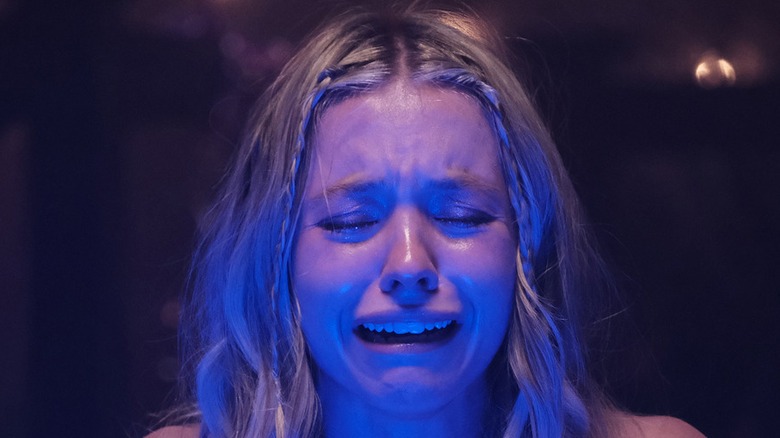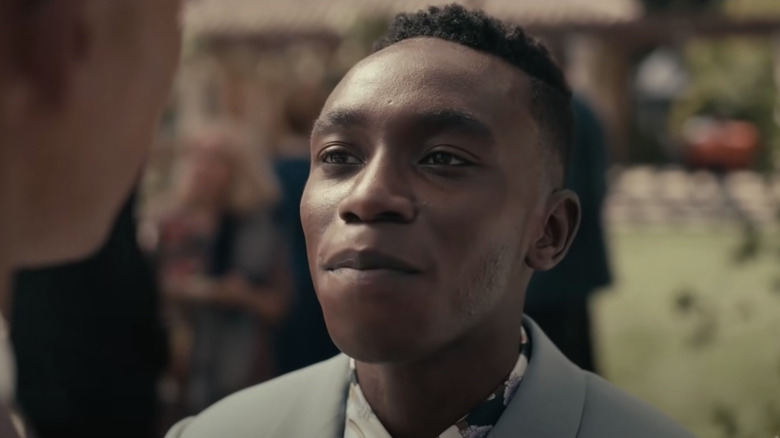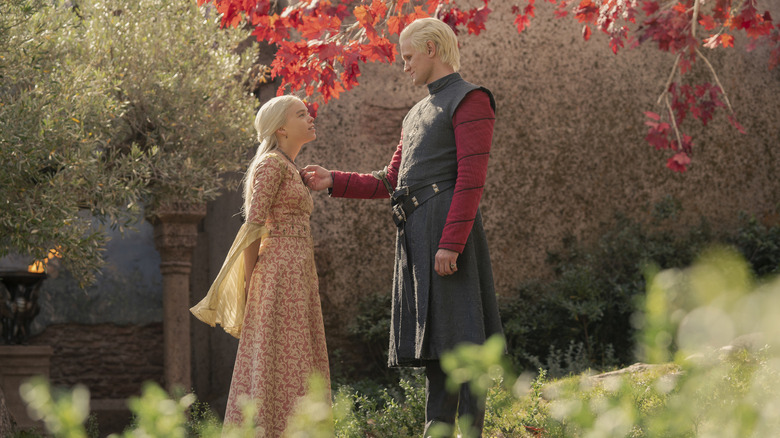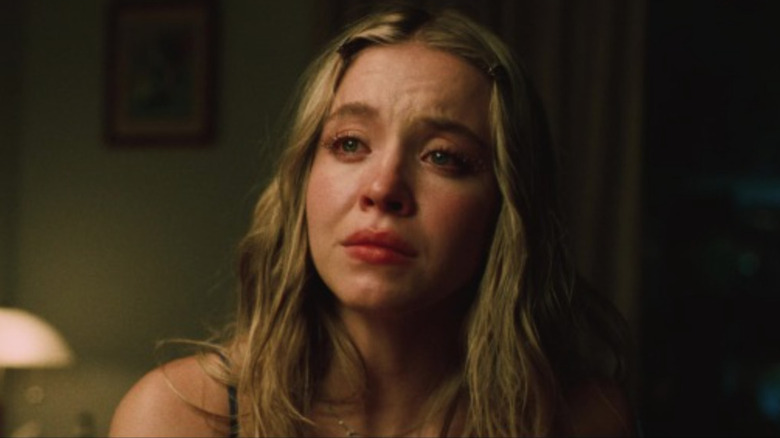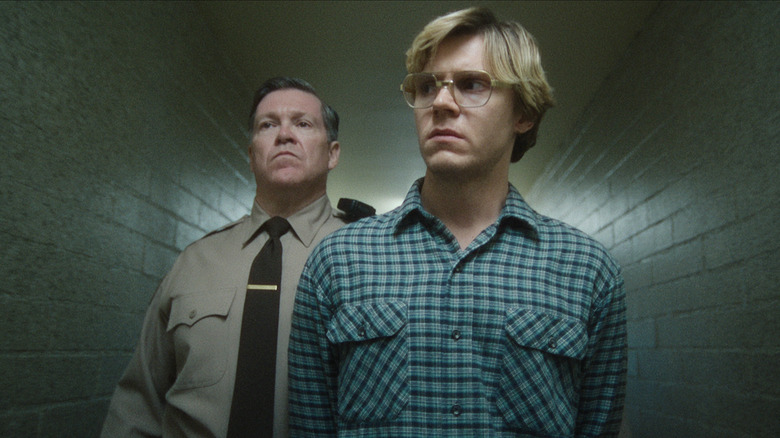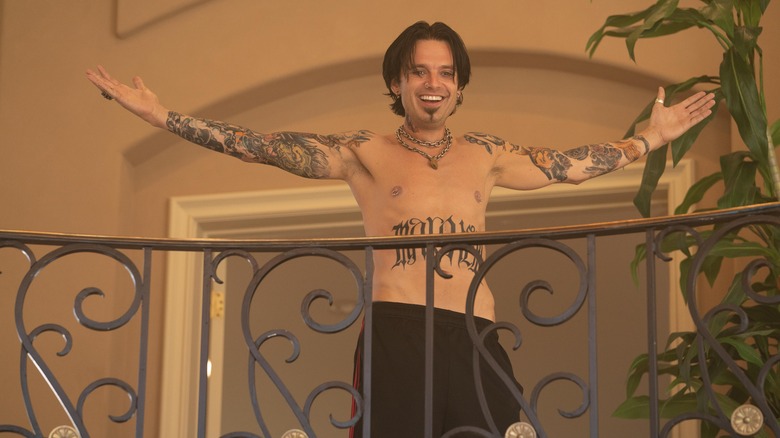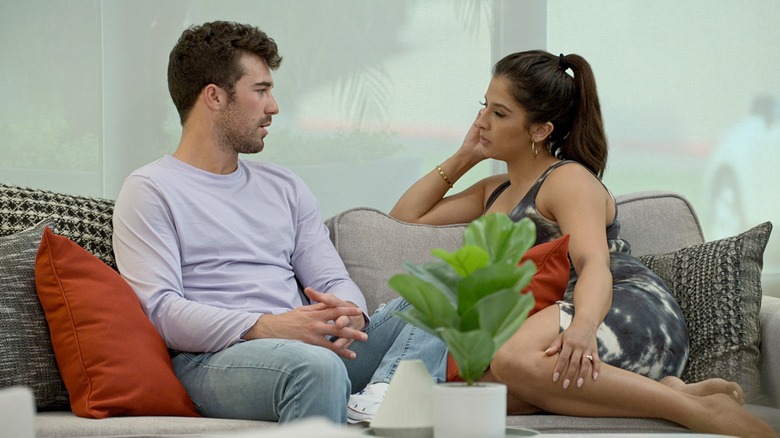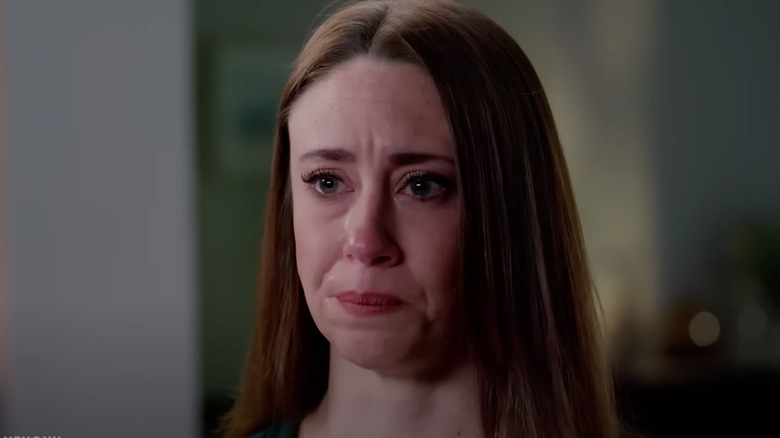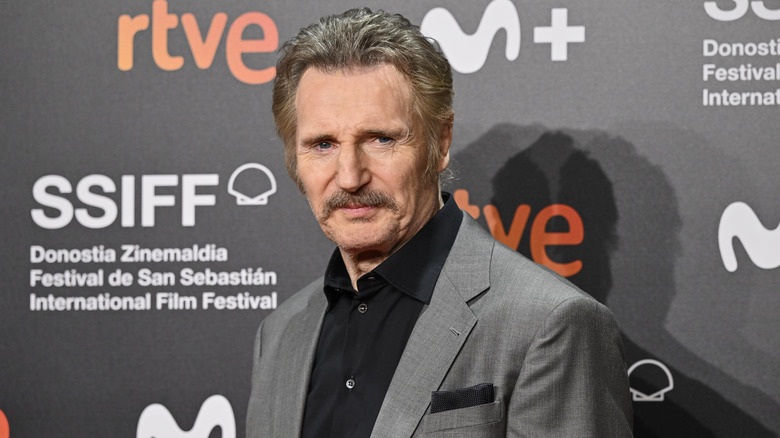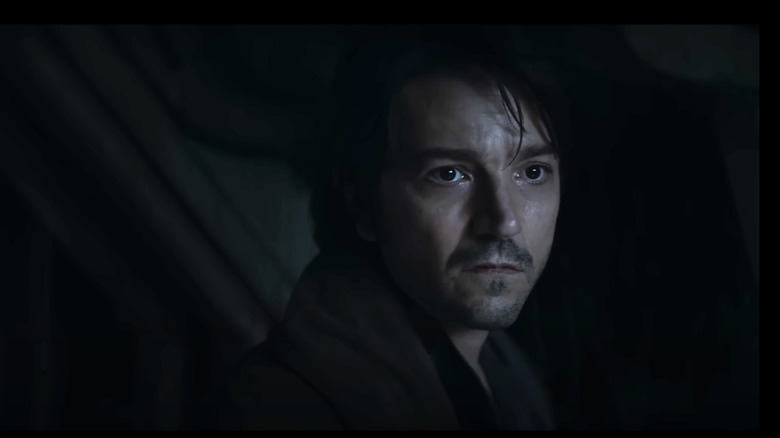The Most Controversial TV Moments Of 2022
When telling stories for TV, pushing the boundaries is bound to ruffle a few feathers. Even as the entertainment industry continues to grow and learn from its past mistakes, it's impossible to please everyone, and there's no escaping controversy. 2022 was no different, with plenty of shocks and surprises to keep TV interesting. Some were more disturbing than others, while others had an underlying humor. Many even sparked important conversations that wouldn't have happened otherwise. And, of course, the internet always had something to say.
Hearts were broken, discussions were had, and memes were made. Whether you disagree with the backlash or take offense, there's no denying the overarching impact of these moments. As we look back at 2022's most controversial TV moments, be aware of potential spoilers and trigger warnings.
The following article includes discussions of sexual assault, racism, child abuse, and eating disorders.
Carlton's defense of white people on Bel-Air
Since the release of the trailer for "Bel-Air," the dramatized reboot of the hit '90s sitcom "The Fresh Prince of Bel-Air," fans have been skeptical of the drastic change in tone of their beloved classic. The Guardian writes in a review, "With an hour an episode and no jokes to make, Bel-Air has all the time in the world to fashion drama about race, class and coming-of-age, but it ends up being less layered and guileful than its source material." Its reboot status may be its biggest problem, as fans can't help but compare the new story to the old. While the overall show has fans divided, one thing everyone seems to agree on is the controversy surrounding the jarring change in Carlton's character.
The '90s version of Carlton may have had some unlikable traits, such as a superiority complex, a jarring disconnect from reality, and an inflated ego. Still, these flaws were balanced out by his heart of gold. The modern version of Carlton takes all his worst qualities and amplifies them to an intolerable level while negating all his redeeming traits.
The controversy only seemed to gain more traction when one scene proved just how unlikeable this character could get. In the pilot episode, Will stumbles into the locker room and hears one of his white classmates rapping along to a song with the N-word. The argument between Will and Carlton about whether a white person can use the word reflects controversial arguments that still occur today. Carlton currently lacks redeeming qualities to weigh against his naïveté and lack of empathy.
House of the Dragon's incestuous age gap
Like its predecessor, "Game of Thrones," the "House of the Dragon" prequel doesn't hold back on its shockingly graphic depictions of medieval culture. But what's harder to watch than bloodbath violence, deadly birth scenes, and unexpected foot fetishes? The on-screen sexual tension between uncle Daemon and niece Rhaenyra. You'd think by now viewers would be immune to seeing incestual relationships after "Game of Thrones," but the significant age gap makes it all the more disturbing. Emma D'Arcy, who plays Rhaenyra after the show's time jump, tells The Independent, "This is essentially a grooming scenario. The idea that a teenage girl is in any way able to consent to that sexual interaction is a mess. There is no way that power can be equally distributed in that relationship."
The most uncomfortable scene between the two occurs in Season 1, Episode 4, when Daemon takes Rhaenyra to a brothel. As if it isn't bad enough that everyone else around them is engaging in sexual acts, the pair start kissing and come close to joining in on the fun until Daemon breaks it off and leaves Rhaenyra all alone. While their relationship may be controversial, it doesn't stop fans from rooting for them — going as far as giving them the couple portmanteau Daemyra. It's hard not to admit they make a pretty good team once Rhaenyra has fully developed her prefrontal cortex later in the show.
Euphoria hypersexualizes Cassie
HBO's "Euphoria" is a teen drama made for adults. This concept leaves some viewers uncomfortable as minors played by fully grown adults partake in explicit, mature acts. Many of the show's plotlines have been deemed controversial and have come under fire. Whether it's the glorification of drugs or the overuse of nudity, some question creator Sam Levinson's motives.
Actor Sydney Sweeney, who plays Cassie, has become the main topic of this discussion. In Season 1, Cassie's backstory of daddy issues and relationship troubles is explored. Always admired for her looks, Cassie leans into her sexual nature to please those she loves — like her football player boyfriend, McKay. Her desperate need for love lands her in hot water when she becomes the victim of revenge porn. This followed Sweeney into her real life when users started posting nude images of Cassie from the show on social media, tagging Sweeney's family (via Variety).
In Season 2, Cassie is worse off when she becomes infatuated with her best friend's abusive ex-boyfriend Nate. Unlike her male counterpart, Cassie's body is on full display whenever she's on camera via the male gaze. The worst of it is depicted during Nate's sexual fantasy in Season 2, Episode 2. It isn't Cassie's nudity alone that's controversial. Sweeney puts it best during an interview with The Independent: "When a guy has a sex scene or shows his body, he still wins awards and gets praise. But the moment a girl does it, it's completely different."
The "Euphoria" cast separately attracted negative attention for off-screen antics that garnered them accusations ranging from Trumpism to racism. It'll be interesting to see how the show handles all the noise in Season 3, if at all.
Dahmer recreates the tragedy of Konerak Sinthasomphone
Although the internet's true crime community has been around for years, 2022 has seen a significant rise in popularity and obsession. With more true crime entertainment being made than ever before, a question of ethics seems to follow every new release. There are instances where the sensitive subject matter is handled with care and integrity. However, viewers seem to be divided when it comes to Netflix's "Dahmer."
One particular scene recreating the real-life death of 14-year-old Konerak Sinthasomphone left viewers enraged — and for good reason. The depictions in the show mirror the failings and negligence of law enforcement and the court system while Dahmer was at large from 1978 to 1991. Sinthasomphone agrees to accompany Dahmer home to take photos in exchange for money his family desperately needed at the time. Dahmer drugs and assaults the minor, who miraculously manages to get away when his tormentor steps out. Two officers arrive at the scene, but Dahmer manages to convince them Sinthasomphone's beaten state is nothing but a lover's quarrel that should be handled alone. The officers agree to let Sinthasomphone back into Dahmer's possession, where he is then killed.
According to Vox, multiple family members have spoken out against Netflix and the creators for never consulting them or asking for their permission to use their stories, including Sinthasomphone's.
If you or anyone you know has been a victim of sexual assault, help is available. Visit the Rape, Abuse & Incest National Network website or contact RAINN's National Helpline at 1-800-656-HOPE (4673).
Sebastian Stan's Tommy Lee has a conversation with his talking genitals
If you bring up that one scene from the Hulu miniseries "Pam & Tommy," everyone who's seen the show will know exactly which one you're talking about. It seems nothing is off limits when recreating the infamous leaking of Pamela Anderson and Tommy Lee's honeymoon sex tape. The scene in question features Sebastian Stan as Lee standing full-frontal in front of a mirror. Just days after meeting Anderson, Lee feels as though Anderson is different. He's falling in love hard and fast — except there's a little voice warning him against it. The voice in his head? Kind of. In a back-and-forth conversation, Lee discusses his feelings with his animated talking genitals. The whole interaction warrants a double take.
Showrunner Rob Siegel explains the reason behind the scene's inclusion: "It came from Tommy Lee himself, his memoir 'Tommyland.' His penis is a character in the book. Throughout the book, he has these, I presume imaginary but maybe not, exchanges between himself and his dick." (via Entertainment Weekly). It's a shocking comedic moment that had people talking for weeks. Among all the TikToks, Reddit posts, and tweets, one Twitter user writes, "Definitely didn't think I'd be seeing a full-frontal CGI talking penis when I subscribed to Disney+ but here we are." Overall the puppet animatronic described by Entertainment Weekly is a much more light-hearted controversy compared to the outrage that came after Pamela Anderson spoke out about never permitting her life to be recreated for TV (via Entertainment Weekly).
The Love Is Blind Cuties scene
Amid all the messy relationship drama throughout Season 3 of Netflix's dating reality show "Love Is Blind," one incident between the now ex-couple Zanab Jaffrey and Cole Barnett stood out and left viewers' jaws on the floor. During the cast's open discussion, Jaffrey says that Barnett's controlling behavior and comments left her with an eating disorder and confidence issues (via Netflix). To prove her point, the infamous "Cuties scene" debuted for all to see at the end of the finale.
While discussing the logistics of their wedding reception, Jaffrey grabs a Cutie orange to snack on. Barnett makes a comment questioning her decision to eat the fruit before dinner. Jaffrey's response makes it clear they've been down this road before. She sarcastically asks for his permission to eat the Cutie and says she's only eaten a banana and a scoop of peanut butter all day. When Barnett asks why, Jaffrey warns that she probably shouldn't say. Like everything in life, the internet was split down the middle, choosing to either side with Jaffrey or Barnett. Despite it all, Jaffrey stands by what she said, telling Netflix, "I had my heart on my sleeve for the duration of the experiment. I will always be open and honest about struggles."
If you need help with an eating disorder, or know someone who is, help is available. Visit the National Eating Disorders Association website or contact NEDA's Live Helpline at 1-800-931-2237. You can also receive 24/7 Crisis Support via text (send NEDA to 741-741).
Casey Anthony gets a platform
More than a decade after the not-guilty murder verdict that outraged the public, Peacock is putting Casey Anthony back in the spotlight for a chance at redemption with "Casey Anthony: Where the Truth Lies." Those familiar with the highly publicized death of Anthony's two-year-old daughter, Caylee Anthony, know how wild the investigation and trial were starting back in 2008. Between all of Anthony's lies, confusing behavior, shameless defense, and condemning evidence, the public deemed Anthony guilty of murder even after her acquittal.
According to Time, the heavily covered 2011 trial "became the social-media trial of the century." With the boom in true crime and the widespread media attention and public outcry surrounding the case, it's no mystery why Peacock would want to cash in on the controversy with Anthony's first on-camera interview — but when you look at social media, no one seems interested in hearing her side of the story.
What does Anthony reveal about the closed case that's so controversial? While defending her innocence with soft-ball interview questions, no opposing evidence, and disingenuous B-roll, Anthony doubles down on the defense that her father was behind Caylee's murder while also accusing her father and brother of sexual abuse. Reviews from The Guardian, Vox, and others highlight the series' controversy and its vain attempt to garner sympathy for a notorious liar.
If you or someone you know may be the victim of child abuse, please contact the Childhelp National Child Abuse Hotline at 1-800-4-A-Child (1-800-422-4453) or contact their live chat services.
Liam Neeson's cameo on Atlanta
A past controversy started making headlines again after Liam Neeson's surprise cameo in Season 3, Episode 4 of Donald Glover's comedy-drama "Atlanta." In the episode written by Glover, Alfred is invited to the mysterious "Cancel Club," where the "Taken" actor recognizes him as Paper Boi. The two engage in a brief conversation where Neeson brings up his 2019 racism controversy to clear the air. The incident refers to Neeson's interview with The Independent, where he describes his emotions after a friend of his was sexually assaulted years ago. "I went up and down areas with a cosh, hoping I'd be approached by somebody – I'm ashamed to say that – and I did it for maybe a week, hoping some [Neeson gestures air quotes with his fingers] 'black bas****' would come out of a pub and have a go at me about something, you know? So that I could . . . kill him." Although Neeson expresses regret and shame in the interview, that didn't stop a wave of backlash. He uses his cameo in the show to once again apologize for his bigoted past, telling Alfred, "I look back now and it honestly frightens me. I thought people knowing who I once was would make clear who I am, who I've become. But with all that being said, I am sorry. I apologize if I hurt people."
If you or anyone you know has been a victim of sexual assault, help is available. Visit the Rape, Abuse & Incest National Network website or contact RAINN's National Helpline at 1-800-656-HOPE (4673).
Emily in Paris stereotypes Ukrainians
Netflix's comedy-drama "Emily in Paris" came under fire again this year for not only being basic but also being culturally insensitive. According to NBC News, the show has a history of offending viewers with its lack of diversity and harmful stereotypes. These shortcomings usually come at the expense of Parisians and minorities, but a scene in Season 2, Episode 4's upset Ukrainians this time.
This season, Emily meets Petra, a Ukrainian living in Paris. Their friendship is quickly compromised when Petra shoplifts while the two are out shopping. Among the many viewers outraged by the depiction was Ukraine's minister of culture, Oleksandr Tkachenko. In a post on his official Telegram channel, Tkachenko expresses his concerns: "In 'Emily in Paris' we have a caricature of a Ukrainian woman, which is unacceptable. On the other hand, it is also offensive. Will Ukrainians be seen as such abroad? Who steal, want to get everything for free, be afraid of deportation? That should not be the case" (via CNN).
First swear word in the Star Wars franchise
Disney+'s "Andor" series is the newest addition to the sprawling "Star Wars" franchise, which comes with big shoes to fill and even bigger expectations from the devoted fanbase. The "Star Wars" universe is a complex phenomenon that should be treated with care. To go ahead and change the story's canon without good reason is a sin beyond forgiveness — at least, that's how some fans felt after hearing the first swear word in "Star Wars" history in Episode 3 of "Andor." In the scene, Sergeant Most exclaims the real-life swear word "s***," rather than an acceptable in-universe swear word such as "kriffing," "karabast," or "dank farrik." Discussions followed on Reddit and Twitter about whether the use of the swear word goes against George Lucas' initial creation of a family-friendly franchise.
It's a good thing another swear word ended up being cut from the season finale. Actor Denise Gough, who plays Dedra Meero, recalls the finale's fire-and-fury funeral monologue to Empire Magazine. "Except, at the end, she didn't say, 'Fight the Empire!' She said, 'F*** the Empire!' Which we were all really excited about. But we weren't allowed to keep it, obviously," Gough explains. Imagine the frenzy that would've been set off by "Star Wars'" first F-bomb.
